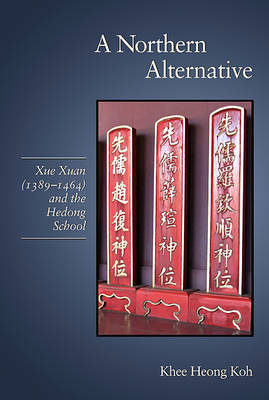
A Northern Alternative
Xue Xuan (1389–1464) and the Hedong School
Seiten
2011
Harvard University, Asia Center (Verlag)
978-0-674-06244-3 (ISBN)
Harvard University, Asia Center (Verlag)
978-0-674-06244-3 (ISBN)
In this first systematic study in English of the highly influential yet overlooked thinker Xue Xuan (1389–1464), author Khee Heong Koh seeks to redress Xue’s marginalization while showing how a study interested mainly in “ideas” can integrate social and intellectual history to offer a broader picture of history.
Conventional portraits of Neo-Confucianism in China are built on studies of scholars active in the south, yet Xue Xuan (1389–1464), the first Ming Neo-Confucian to be enshrined in the Temple to Confucius, was a northerner. Why has Xue been so overlooked in the history of Neo-Confucianism? In this first systematic study in English of the highly influential thinker, author Khee Heong Koh seeks to redress Xue’s marginalization while showing how a study interested mainly in “ideas” can integrate social and intellectual history to offer a broader picture of history.
Significant in its attention to Xue as well as its approach, the book situates the ideas of Xue and his Hedong School in comparative perspective. Koh first provides in-depth analysis of Xue’s philosophy, as well as his ideas on kinship organizations, educational institutions, and intellectual networks, and then places them in the context of Xue’s life and the actual practices of his descendants and students. Through this new approach to intellectual history, Koh demonstrates the complexity of the Neo-Confucian tradition and gives voice to a group of northern scholars who identified themselves as Neo-Confucians but had a vision that was distinctly different from their southern counterparts.
Conventional portraits of Neo-Confucianism in China are built on studies of scholars active in the south, yet Xue Xuan (1389–1464), the first Ming Neo-Confucian to be enshrined in the Temple to Confucius, was a northerner. Why has Xue been so overlooked in the history of Neo-Confucianism? In this first systematic study in English of the highly influential thinker, author Khee Heong Koh seeks to redress Xue’s marginalization while showing how a study interested mainly in “ideas” can integrate social and intellectual history to offer a broader picture of history.
Significant in its attention to Xue as well as its approach, the book situates the ideas of Xue and his Hedong School in comparative perspective. Koh first provides in-depth analysis of Xue’s philosophy, as well as his ideas on kinship organizations, educational institutions, and intellectual networks, and then places them in the context of Xue’s life and the actual practices of his descendants and students. Through this new approach to intellectual history, Koh demonstrates the complexity of the Neo-Confucian tradition and gives voice to a group of northern scholars who identified themselves as Neo-Confucians but had a vision that was distinctly different from their southern counterparts.
Khee Heong Koh is Assistant Professor in the Department of Chinese Studies at the National University of Singapore.
| Erscheint lt. Verlag | 19.10.2011 |
|---|---|
| Reihe/Serie | Harvard-Yenching Institute Monograph Series |
| Zusatzinfo | 2 maps, 24 tables |
| Sprache | englisch |
| Maße | 152 x 229 mm |
| Themenwelt | Literatur ► Biografien / Erfahrungsberichte |
| Geisteswissenschaften ► Geschichte ► Regional- / Ländergeschichte | |
| Geschichte ► Teilgebiete der Geschichte ► Kulturgeschichte | |
| Geisteswissenschaften ► Philosophie ► Östliche Philosophie | |
| Geisteswissenschaften ► Religion / Theologie ► Weitere Religionen | |
| ISBN-10 | 0-674-06244-2 / 0674062442 |
| ISBN-13 | 978-0-674-06244-3 / 9780674062443 |
| Zustand | Neuware |
| Haben Sie eine Frage zum Produkt? |
Mehr entdecken
aus dem Bereich
aus dem Bereich
der stille Abschied vom bäuerlichen Leben in Deutschland
Buch | Hardcover (2023)
C.H.Beck (Verlag)
23,00 €
vom Mittelalter bis zur Gegenwart
Buch | Softcover (2024)
C.H.Beck (Verlag)
12,00 €


